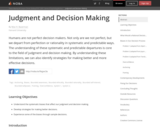
Text and links to all ancillary materials for Module 19
- Subject:
- Psychology
- Social and Behavioral Sciences
- Material Type:
- Module
- Reading
- Teaching/Learning Strategy
- Author:
- Max H
- Date Added:
- 05/31/2021

Text and links to all ancillary materials for Module 19

Our subject is the ethics of leadership, an examination of the principles appealed to by executive authority when questions arise about its sources and its legitimacy. Most treatments of this subject resort to case-studies in order to illustrate the application of ethical principles to business situations, but our primary emphasis will be upon classic works of imaginative literature, which convey more directly than case-studies the ethical pressures of decision-making. Readings will include works by Shakespeare, Sophocles, Shaw, E.M. Forster, Joseph Conrad, George Orwell, Fyodor Dostoyevsky, and Henrik Ibsen, among others. Topics to be discussed include the sources of authority, the management of consensus, the ideal of vocation, the ethics of deception, the morality of expediency, the requirements of hierarchy, the virtues and vices of loyalty, the relevance of ethical principles in extreme situations.

This course begins with a comparative review of conventional and advanced multiple attribute decision making (MADM) models in engineering practice. Next, a new application of particular MADM models in reliable material selection of sensitive structural components as well as a multi-criteria Taguchi optimization method is discussed. Other specific topics include dealing with uncertainties in material properties, incommensurability in decision-makers opinions for the same design, objective ways of weighting performance indices, rank stability analysis, compensations and non-compensations.

Core subject for students majoring in management science. Surveys individual and social psychology and organization theory interpreted in the context of the managerial environment. Laboratory involves projects of an applied nature in behavioral science. Emphasizes use of behavioral science research methods to test hypotheses concerning organizational behavior. Instruction and practice in communication include report writing, team decision-making, and oral and visual presentation. Twelve units may be applied to the General Institute Laboratory Requirement.
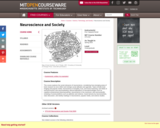
This course explores the social relevance of neuroscience, considering how emerging areas of brain research at once reflect and reshape social attitudes and agendas. Topics include brain imaging and popular media; neuroscience of empathy, trust, and moral reasoning; new fields of neuroeconomics and neuromarketing; ethical implications of neurotechnologies such as cognitive enhancement pharmaceuticals; neuroscience in the courtroom; and neuroscientific recasting of social problems such as addiction and violence. Guest lectures by neuroscientists, class discussion, and weekly readings in neuroscience, popular media, and science studies.

Subject enhances students' ability to take effective action in complex organizational settings by providing the analytic tools needed to analyze, manage, and lead the organizations of the future. Emphasis on the importance of the organizational context in influencing which individual styles and skills are effective. Employs a wide variety of learning tools, from experiential learning to the more conventional discussion of written cases. Subject centers on three complementary perspectives on organizations: the strategic design, political, and cultural "lenses" on organizations. Restricted to first-year Sloan master's students.

This document provides a checklist tool for managers and leaders in distance education centers and online departments to utilize when prioritizing projects and determining workload allocation. It includes sections on assessing project alignment with organizational goals, evaluating resources needed, considering risks and constraints, and scoring/ranking projects. The checklist encourages objective analysis of proposed initiatives to aid in decision-making on what projects should move forward.
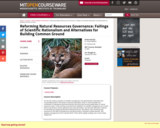
For the last century, precepts of scientific management and administrative rationality have concentrated power in the hands of technical specialists, which in recent decades has contributed to widespread disenfranchisement and discontent among stakeholders in natural resources cases. In this seminar we examine the limitations of scientific management as a model both for governance and for gathering and using information, and describe alternative methods for informing and organizing decision-making processes. We feature cases involving large carnivores in the West (mountain lions and grizzly bears), Northeast coastal fisheries, and adaptive management of the Colorado River. There will be nightly readings and a short written assignment.
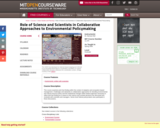
This course examines joint fact-finding within the context of adaptive and ecosystem-based management. Challenges and obstacles to collaborative approaches for deciding environmental and natural resource policy and the institutional changes within federal agencies necessary to utilize joint fact-finding as a means to link science and societal decisions are discussed and reviewed with scientists and managers. Senior-level federal policymakers participate

Introduction to mathematical modeling, optimization, and simulation, as applied to manufacturing. Specific methods include linear programming, network flow problems, integer and nonlinear programming, discrete-event simulation, heuristics and computer applications for manufacturing processes and systems. Restricted to Leaders for Manufacturing students. One objective of 15.066J is to introduce modeling, optimization and simulation, as it applies to the study and analysis of manufacturing systems for decision support. The introduction of optimization models and algorithms provide a framework to think about a wide range of issues that arise in manufacturing systems. The second objective is to expose students to a wide range of applications for these methods and models, and to integrate this material with their introduction to operations management.

A computational and application-oriented introduction to the modeling of large-scale systems in a wide variety of decision-making domains and the optimization of such systems using state-of-the-art optimization software. Application domains include transportation and logistics, pattern classification, structural design, financial engineering, and telecommunications system planning. Modeling tools and techniques covered include linear, network, discrete, and nonlinear programming, heuristic methods, sensitivity and postoptimality analysis, decomposition methods for large-scale systems, and stochastic programming.

Subject provides a conceptual framework for thinking about taxes. Applications covered include mergers and acquisitions, tax arbitrage strategies, business entity choice, executive compensation, multi-national tax planning, and others. Aimed at investment bankers and consultants who need to understand how taxes affect the structure of deals; managers and analysts who need to understand how firms strategically respond to taxes; and entrepreneurs who want to structure their finances in a tax-advantaged manner.

What is economics and why should you spend your time learning it? After all, there are other disciplines you could be studying, and other ways you could be spending your time. As the Bring it Home feature just mentioned, making choices is at the heart of what economists study, and your decision to take this course is as much an economic decision as anything else.
Economics is probably not what you think it is. It is not primarily about money or finance. It is not primarily about business. It is not mathematics. What is it then? It is both a subject area and a way of viewing the world.

11.941 and 11.942 make up a one-year seminar. The goal of this seminar is to explore the role of science and scientists in ecosystems and natural resources management focusing on joint fact finding as a new approach to environmental policy-making. Increasingly scientists and science organizations are confronting a conundrum: Why is science often ignored in important societal decisions even as the call for decisions based on sound science escalates? One reason is that decision-making is often driven by a variety of nonscientific, adversarial, and stakeholder dynamics. Thus, even though science helps inform choices, it is only one of many values and interests considered by each stakeholder. In response to this emerging challenge, scientists, and science agencies such as the U.S. Geological Survey, are embarking upon research that explores the problems of incorporating science into value-laden societal decisions. This research includes designing experiments that will assess the appropriateness of using the new and emerging approach of Joint Fact Finding to address some of the Nation's most contentious environmental conflicts. In the first few sessions we will examine the problems of using science in environmental disputes. In following sessions, students will analyze and discuss cases that involved or that should have involved Joint Fact Finding of various kinds.

This course makes up the second half of a year-long seminar on Joint Fact Finding in Science-Intensive Disputes. In 11.941, the first half of the seminar, students analyzed and discussed cases that involved or that should have involved Joint Fact Finding of various kinds. In this portion, students concentrate on gathering information to assist in resolving the Cape Wind project, the dispute concerning the placement of wind farms in waters adjacent to Nantucket. Students will lay the groundwork for a collaborative project that includes Federal and State agencies, academic institutions and non-profits.

Dan Gilbert, author of "Stumbling on Happiness," challenges the idea that we'll be miserable if we don't get what we want. Our "psychological immune system" lets us feel truly happy even when things don't go as planned.
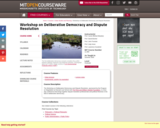
The Workshop on Deliberative Democracy and Dispute Resolution,sponsored by the Program on Negotiation at Harvard Law School and the Flora and William Hewlett Foundation, is a two-day conference that brings together dispute resolution professionals and political theorists in the field of deliberative democracy.